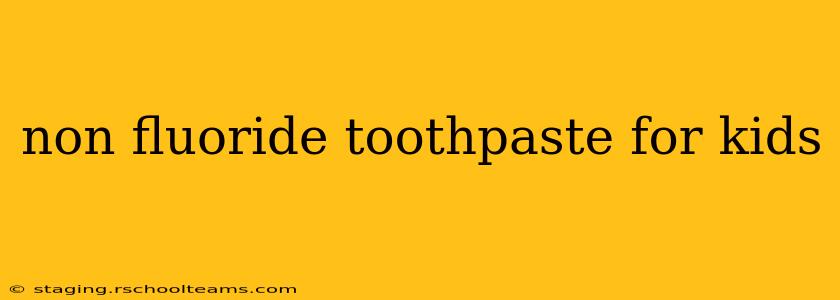Choosing the right toothpaste for your child can feel overwhelming, especially when considering the fluoride debate. Many parents opt for non-fluoride toothpaste for their kids, driven by concerns about fluoride's potential effects. This guide provides a comprehensive overview of non-fluoride toothpaste for children, addressing common questions and concerns.
Why Choose Non-Fluoride Toothpaste for Kids?
Some parents choose non-fluoride toothpaste due to concerns about potential adverse effects of fluoride, such as dental fluorosis (a cosmetic discoloration of teeth) or other health issues. While the scientific consensus supports the safety and effectiveness of fluoride in preventing cavities, the decision to use fluoride or non-fluoride toothpaste is ultimately a personal one, often based on individual family values and beliefs. It's crucial to discuss any concerns with your child's pediatrician or dentist.
What are the Ingredients in Non-Fluoride Toothpaste for Kids?
Non-fluoride toothpastes for kids typically contain mild abrasives to clean teeth, humectants to maintain moisture, and flavoring agents to make brushing more appealing. They may also include xylitol, a natural sweetener that can help prevent bacterial growth, and other natural ingredients like calcium carbonate or hydrated silica. Always check the ingredient list to ensure the toothpaste is suitable for your child's age and sensitivities.
What are the benefits of non-fluoride toothpaste for kids?
The primary benefit is the avoidance of fluoride. For parents concerned about fluoride's potential effects, this is a key factor. Some parents also prefer natural ingredients found in many non-fluoride options. It's important to note that the effectiveness in cavity prevention might be lower compared to fluoride toothpaste.
Is non-fluoride toothpaste effective at preventing cavities?
While fluoride is highly effective at preventing cavities, some non-fluoride toothpastes contain alternative ingredients that offer some level of protection. These often include xylitol and other natural agents that inhibit bacterial growth. However, they are generally not as effective as fluoride toothpaste in preventing cavities. Regular brushing and flossing, along with regular dental check-ups, are crucial regardless of the type of toothpaste used.
How should I teach my child to brush their teeth with non-fluoride toothpaste?
Teaching good brushing habits is vital, regardless of the toothpaste type. Start by letting your child use a pea-sized amount of toothpaste, ensuring they spit it out afterwards. Supervise their brushing until they're around six years old or older to ensure they're effectively cleaning their teeth. Make brushing fun with songs, timers, and positive reinforcement.
Are there any side effects to using non-fluoride toothpaste?
Generally, non-fluoride toothpaste doesn't have significant side effects. However, some children might have allergic reactions to certain ingredients. Always check the ingredient list and consult your pediatrician if you notice any adverse reactions.
Can I switch from fluoride to non-fluoride toothpaste?
Switching between fluoride and non-fluoride toothpastes is generally fine, but it's always best to discuss it with your dentist or pediatrician. They can provide personalized advice based on your child's oral health needs and risk factors for cavities. Remember that consistent brushing habits are far more important than the specific type of toothpaste used.
How do I choose the right non-fluoride toothpaste for my child?
Look for toothpastes specifically designed for children. Check the ingredient list, ensuring it's free of harsh chemicals and contains ingredients safe for young children. Consider age-appropriate flavors and textures to make brushing more enjoyable. Always check for the American Dental Association (ADA) Seal of Acceptance, which indicates the toothpaste has met certain safety and efficacy standards, although this seal doesn't guarantee the absence of fluoride.
By carefully considering your child's individual needs and discussing your options with your dentist or pediatrician, you can make an informed decision about the best toothpaste for your child's oral health. Remember, consistent brushing and regular dental check-ups are paramount in maintaining healthy teeth and gums.
